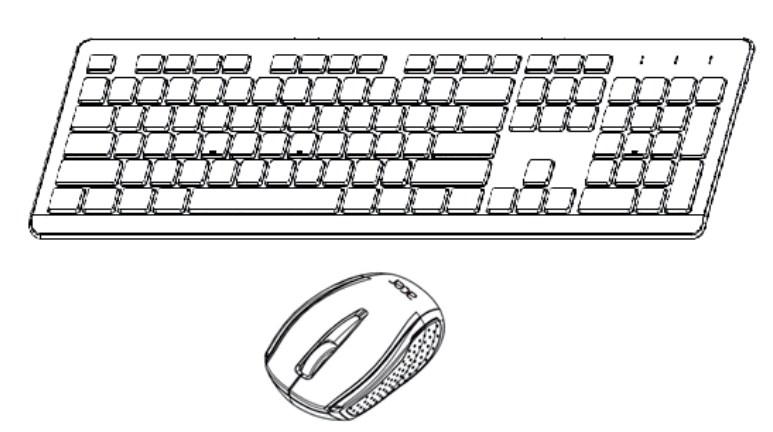Acer AKR120 Wireless Keyboard User Guide

acer AKR120 Wireless Keyboard

Mouse Specifications
- Model: AMR800
- Buttons: 3
- Sensor Type: Optical
- Dimensions (L x W x H): 95.2 x 58.5 x 34.6 mm
- Weight: 50 ± 10 g
- Connector Type: RF 2.4 GHz
- DPI: 1600
Device Features
- Scrolling wheel
- Right button
- Left button
- Battery cover
- ON/OFF switch
- Connect button
Keyboard Specifications
- Model: AKR120
- Dimensions (L x W x H): 435.68 x 132.47 x 27.62 mm
- Weight: 472 ± 20 g
- Connector Type: RF 2.4 GHz
Device Features
LED Indicator
Power On: LED is on for 10 seconds
Low Battery:
- Blinks for 10 seconds and turns off after power on.
- Flashes continuously during work, and turns off after 10 seconds.
Manufacturer address
8F, No. 88, Sec. 1, Xintai 5th Rd., Xizhi Dist., New Taipei City 221, Taiwan Please visit www.acer.com for warranty.
Setup the Connection between the Receiver and the Mouse, Keyboard.
How to Use
- Open the battery compartment cover at the bottom of the mouse & keyboard.
- Insert the batteries into the mouse and keyboard, then follow the steps below.
- Replace the battery compartment cover.
- Plug the USB receiver into one of your computer’s USB ports. Now you are ready to use the devices.
Contents of the Box
- RF 2.4GHz Mouse x1
- RF 2.4GHz Keyboard x1
- AAA Battery x4
- Quick Start Guide x1
- Warranty Booklet x1
Caution
- Do not disassemble the device or operate the device under abnormal conditions.
- Do not submerge the device in water.
- If the device could not be functional, or there was thermal abnormal situation, please re-plug into USB ports.
- If you still encounter problems after going through the corrective measures, please contact your dealer or an authorized service center for assistance.
- For more information regarding Acer accessories, please visit Acer website at www.acer.com.
Environment
Temperature:
- Operating: 0 °C to 40 °C
- Non-operating: -10 °C to 65 °C Humidity (non-condensing):
- Operating: 10% to 90%
- Non-operating: 10% to 90%
FCC STATEMENT
This device complies with Part 15 of the FCC Rules. Operation is subject to the following two conditions:
- This device may not cause harmful interference,and
- This device must accept any interference received, including interference that may cause undesired operation.
- Changes or modifications not expressly approved by the party responsible for compliance could void the user’s authority to operate the equipment.
NOTE:
This equipment has been tested and found to comply with the limits for a Class B digital device, pursuant to Part 15 of the FCC Rules. These limits are designed to provide reasonable protection against harmful interference in a residential installation.
This equipment generates uses and can radiate radio frequency energy and, if not installed and used in accordance with the instructions, may cause harmful interference to radio communications. However, there is no guarantee that interference will not occur in a particular installation. If this equipment does cause harmful interference to radio or television reception, which can be determined by turning the equipment off and on, the user is encouraged to try to correct the interference by one or more of the following measures:
- Reorient or relocate the receiving antenna.
- Increase the separation between the equipment and receiver.
- Connect the equipment into an outlet on a circuit different from that to which the receiver is connected.
- Consult the dealer or an experienced radio/TV technician for help.
RF warning statement:
The device has been evaluated to meet general RF exposure requirements. The device can be used in portable exposure conditions without restriction.
IC warning
This device contains license-exempt transmitter(s)/receiver(s) that comply with Innovation, Science and Economic Development Canada’s license-exempt RSS(s). Operation is subject to the following two conditions:
- This device may not cause interference; and
- This device must accept any interference, including interference that may cause undesired operation of the device.